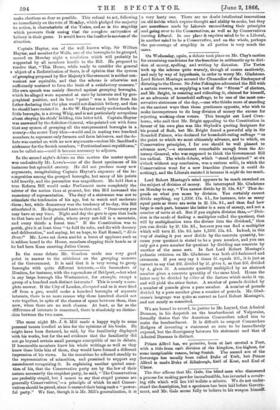Captain Hayter, son of the well known whip, Sir William
Haytas, and member for Wells, one of the boroughs to be grouped, moved on Monday night a resolution which will probably be supported by all members hostile to the Bill. He proposed to resolve that, "This House, while ready to consider the general s ubject of a Redistribution of Seats, is of opinion that the system of grouping proposed by Her Majesty's Government is neither con- venient nor equitable, and that the scheme is otherwise not sufficiently matured to form the basis of a satisfactory measure." His own speech was mainly directed against grouping boroughs, which he alleged were separated at once by interests and by geo- graphical position, and its best " point " was a letter from his father declaring that the plan would not diminish bribery, and that he should have resisted it. As Sir W. Hayter really understands the little boroughs, is a strong Whig, and is not particularly scrupulous about obeying his chiefs' bidding, this letter told. Captain Hayter was answered by the Solicitor-General, who pointed out with force that any system of grouping all the unrepresented boroughs in a county—the secret Tory idea—would end in seating two hundred members to represent only farmers and farm labOureis, and the de- bate was carried on with no new arguments—unless Mr. Sandford's nickname for the Scotch members, " Puritanical semi-republicans," can be called one—until it became necessary to adjourn.






























 Previous page
Previous page